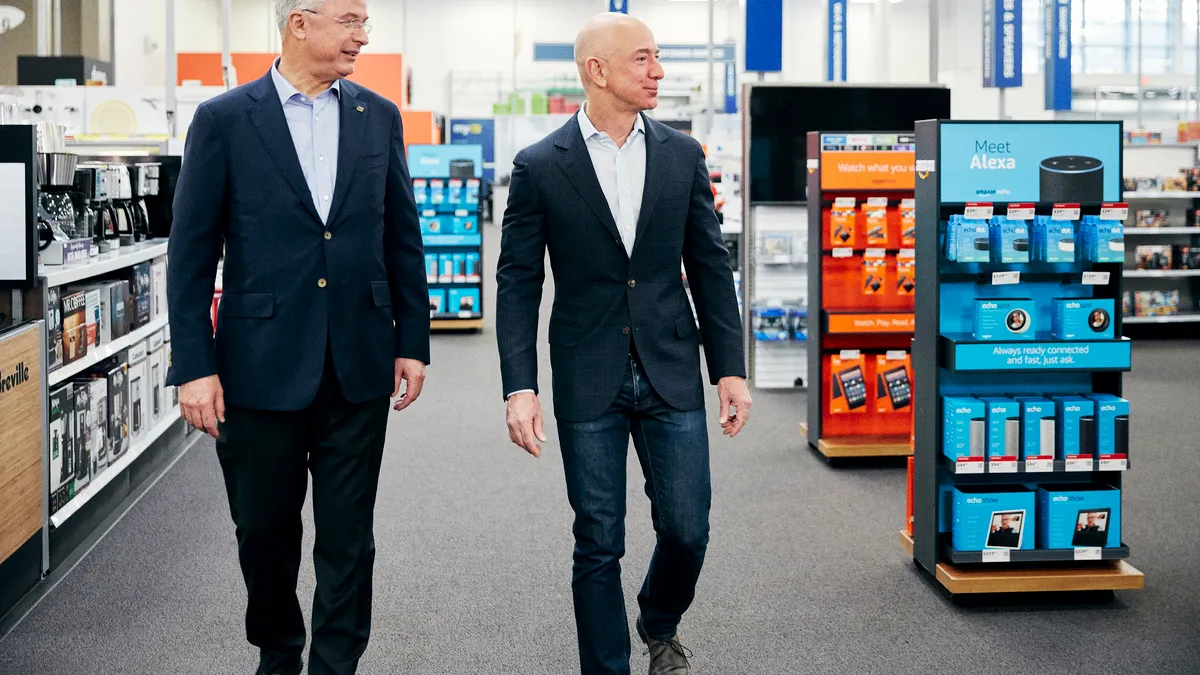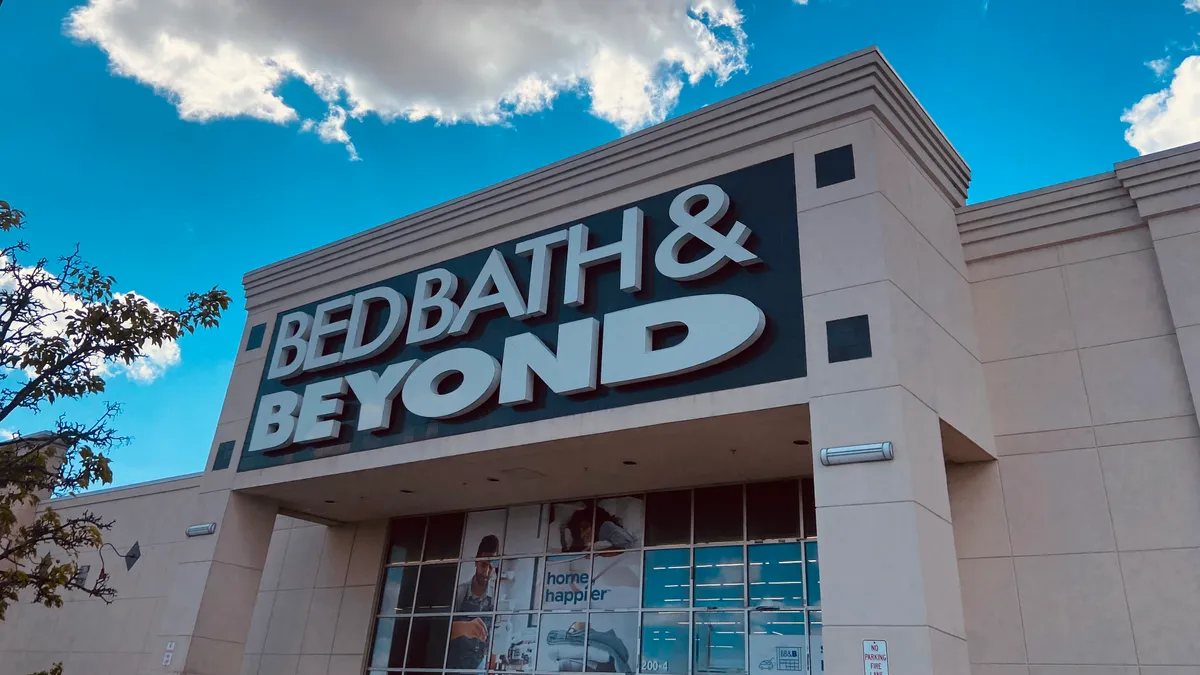Amazon and Best Buy are getting to be quite a pair.
The two solidified their relationship this week with the announcement that they’re teaming up to sell Amazon’s new Fire TV Edition smart TVs in the United States beginning this summer and in Canada later this year.
Best Buy has long sold Amazon devices and over the holidays staged a careful campaign with the e-commerce giant's voice assistant, Alexa. The new effort is a considerably deeper connection, designating Best Buy’s stores and website as the exclusive retailer for more than 10 of the 4K and HD Fire TV Edition models, with more coming later in the year. And for the first time, Best Buy will be a third-party seller on Amazon.com.
"Amazon and Best Buy have a long history of working together, and today we take our partnership to a new level," Amazon CEO Jeff Bezos said in a statement Wednesday.
Moody's Investors Service Lead Retail Analyst Charlie O'Shea counts the latest tie-up as a win-win, according to comments emailed to Retail Dive. "In this iteration, Best Buy gets new devices that will drive foot traffic into its stores, and Amazon gets a brick-and-mortar showroom for more of its proprietary products," he said.
"We do not see this move as an indication that Amazon may buy Best Buy. The deal appears to be more about Amazon as an owner of technology brands than as a retailer, and it suggests that Amazon sees distribution through brick-and-mortar stores as important for its technology brands."

John Mercer
Senior Analyst, Coresight Research
That doesn’t mean these two are talking about making it official. "We do not see this move as an indication that Amazon may buy Best Buy," John Mercer, senior analyst at retail think tank Coresight Research (formerly Fung Global Retail & Technology), told Retail Dive in an email on any merger possibility, adding that it more closely resembles Amazon's deal to sell Echo devices and take returns through Kohl's stores. "The deal appears to be more about Amazon as an owner of technology brands than as a retailer, and it suggests that Amazon sees distribution through brick-and-mortar stores as important for its technology brands."
Still, the Best Buy-Amazon partnership for Smart TV sales brings the companies closer than they had ever been before, according to Luke Starbuck, vice president of marketing at customer care automation platform Linc. "While it could be considered an extension of the Alexa showcase tables seen in 700 Best Buy stores, the product partnership places FireTV and Alexa into Best Buy’s own Insignia Smart TVs and goes well beyond a merchandising collaboration," he told Retail Dive in an email. "It will also be the first time Best Buy sells products on Amazon’s marketplace."
What’s in it for Best Buy
When any major brand partners with Amazon, many, including retail prophet Doug Stephens, see it as short-sighted consorting with an enemy that could ultimately use a retailer’s own customer data against it. But Best Buy has much to gain from its work with the e-commerce giant, building on a successful sales effort through Alexa last year that Mihir Kittur, co-founder and chief commercial officer at managed analytics company Ugam, says "stole the show" in voice shopping by any retailer through the holidays — often beating Amazon on its own channel.
This of course assumes they have a choice. Best Buy needed to completely reinvent the electronics buying experience a decade ago. The fact that they (and Kohls) chose not to innovate has led them to a devil’s bargain. Partner with Amazon or let them kill you. https://t.co/z7sg63IdA3
— Doug Stephens (@RetailProphet) April 19, 2018
The deal also gets Best Buy new ways to extend its reach centered on the Alexa ecosystem, according to Linc's Starbuck. "And they will get to experience and learn from selling on Amazon’s marketplace in a controlled and manageable way," he said, noting that the resulting insights will help Best Buy make informed future decisions about whether they increase their presence on Amazon’s marketplace.
And while Starbuck warned that Amazon could also benefit from some of those insights, Stephen Baker, vice president and industry advisor of technology and mobile at The NPD Group, dismisses the notion. "Amazon doesn't get any special incremental data here that they wouldn't get if this relationship didn't occur," he told Retail Dive in an email. "This is about Best Buy selling hardware to consumers and offering them a broad choice of products that are available in the market."
That’s pretty much what Best Buy CEO Joly said on Wednesday. "Our partnership with Amazon is exciting because we believe Fire TV Edition delivers an incredible user experience and further strengthens the growing connection between home theater, home automation and voice control," he said in a statement.
Which sounds like Best Buy is getting an exclusive deal to sell something it thinks people will buy — which is not a particularly new, disruptive or defensive move in retail, but rather, supremely fundamental. "Best Buy is competing and winning with Amazon retail because they understand the unique needs of the consumer electronics marketplace better than anyone," NPD Group’s Baker said. "As long as the consumer electronics market is strong and vibrant, Best Buy will be as well."
What’s in it for Amazon
Bottom line, says Baker — Amazon needs this deal more than Best Buy does. "Best Buy is the most important U.S. retailer for consumer electronics. Everyone who wants to sell products like this comes to Best Buy — Amazon is no exception." he said. "If you have large hardware brand aspirations you have to sell through Best Buy, and they know how to leverage their strength with their partners."
Stores in general remain an important sales channel for televisions, and while Amazon’s bookstores and even the newly acquired Whole Foods stores have been stealth retail sites for Echo devices, neither place is suitable for selling this level of electronics. "Amazon gains distribution sites for its 4K and HD Fire TVs, and this is an area where Best Buy is able to boast a good deal of expertise," says Ugam’s Kittur. "Most importantly for Amazon, it gains greater access to a crucial customer touchpoint."
Considering how Alexa is a stowaway on each of those new Fire TVs, the voice assistant stands to gain a lot. Amazon Echo already leads the market with some 69% market share, and Google Home holds nearly all that remains, according to Consumer Intelligence Research Partners.
"Best Buy clearly has a large and important relationship with Google, as well. Having Fire on these TVs is more important for Amazon than for Best Buy."

Stephen Baker
Vice President, The NPD Group
"Having Alexa-equipped TVs featured in the leading consumer electronics chain across the country could supercharge user adoption, and help Amazon establish dominance against other voice-assistant platforms," Starbuck noted. "Where the Echo devices appeal to those willing to experiment with new technology in the home, the television is perhaps the most ubiquitous of all in home tech. As the smart TV market grows due to the convenience of streaming services, Amazon will be able to reach many more consumers with Alexa, and build the voice-controlled habits that lead people to buy Echo devices and ecosystem products."
That's another way Amazon has more at stake than Best Buy, Baker says. "Everyone is doubling down on Alexa, and voice in general," he noted. "Best Buy clearly has a large and important relationship with Google, as well. Having Fire on these TVs is more important for Amazon than for Best Buy. Amazon needs to be more competitive in positioning the TV as the hub of your smart home race."
Win-win-win
As Moody’s noted Wednesday, the deal overall is a good match for both companies. "Best Buy will make out very well in this deal, as will Amazon," Baker agrees.
Bahige El-Rayes, principal in A.T. Kearney’s consumer and retail practice compares it to Alibaba’s efforts in China to create synergies through its online sites and Hema brick-and-mortar stores. "Today, the two concepts operate in a seamlessly integrated fashion," he said in an email to Retail Dive. "The average customer makes 4.5 purchases a month on Alibaba sites. Conversion for people who open the Hema app is 35%, and online account for more than half of total orders. Convergence is the name of the game, and this [Amazon and Best Buy] is a clear example."
If that pans out well for both companies and their customers, voice-based interactions seem destined to rapidly accelerate in the U.S., and Starbuck thinks we'll see that pretty soon. "For brands across all categories, one message should be clear: more people will have Amazon’s Alexa in their home because of this partnership, and more consumers will become comfortable with voice assistants this year," he said. "This makes voice an even more compelling platform than it already was."























